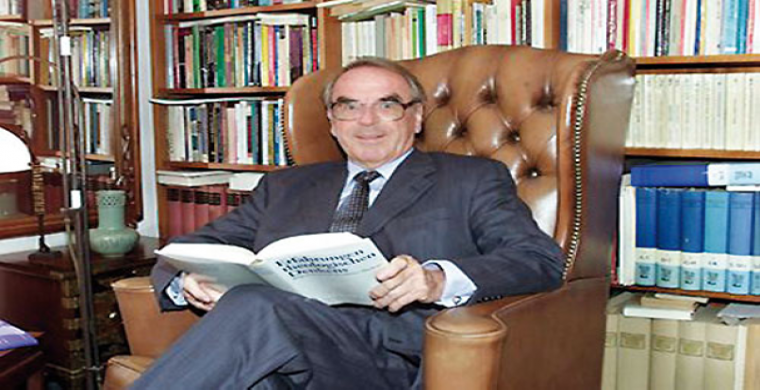Juergen Moltmann on Christian Discipleship in Everything One Does
By Roger E. Olson
http://www.patheos.com/
November 20, 2014
This is a follow-up to my immediately preceding post which contained my response to Peter Berger's argument that Christians (and others) ought to internalize pluralism including secularity--alongside their Christian faith. In other words, Berger argues, Christians (and others) ought to act "as if God does not exist" in certain spheres of life because of modern pluralism. Both in the book (The Many Altars of Modernity) and in his talk Berger illustrated this claim by saying that an airline pilot flies the plane as if God does not exist--even if he is a Christian. And a surgeon performs surgery as if God does not exist--even as a Christian. He also uses St. Teresa of Avila, the great Catholic mystic of the Renaissance, to point out that, although she was a mystic, she governed and administered her religious community just like anyone else would--as if God does not exist.
My response is that a Christian (I won't dare to speak for other religious people) ought never to think or act in any situation as if God does not exist. I admit that many do! But that is accommodation to modern secularity and pluralism and constitutes a kind of internal dualism. I admit, of course, that a sociologist observing a Christian airline pilot or Christian surgeon or mystic administrating her community will not observe anything different in how these Christians carry out their vocations and tasks. But to assume that because they carry them out externally just like anyone else would does not justify claiming that they are flying, operating, or administering "as if God does not exist."
A Christian airline pilot, hopefully, will regard his piloting as his vocation--a calling and gifting from God and fly "for God's glory and neighbors' good" as opposed, for example, to regarding flying as nothing more than a way of earning a living or getting from one place to another or impressing others or meeting pretty flight attendants. All those things may and probably will play into a Christian's thinking about his career, but they will not be his primary motivation. And, probably, hopefully, a Christian airline pilot will regard the mechanics of flight as ultimately governed by God's general providence as opposed to "pure nature" (to use Hans Urs von Balthasar's derogatory term for the secular view of reality). And, hopefully, a Christian airline pilot will pray before getting into the cockpit--for God's protection of him and his passengers and for help in flying the plane to the vest best of his ability. A sociologist observing him will observe none of this and therefore assume, wrongly, that he is flying the plane "as if God does not exist." But he would be wrong.
Flying a plane "as if God exists" does not require relying on miracles--although should the plane begin to fail in its flight a Christian pilot, together with many of his passengers, will probably pray for a miracle! It only requires a certain mindset and attitude, disposition, about being a pilot.
Luther said that a milkmaid who milks cows in faith is doing something more spiritual than all the bishops of Rome.
Long before airplanes or surgery Christians were driving chariots, building houses, engaging in commerce, "as if God does not exist" from a purely sociological perspective. That is, they did all these things just like unbelievers--as to external behaviors (so long as they were done ethically). The difference was then and now that a Christian does these things to the glory of God and for the neighbors' good--that is, in faith. And Christians do all these things past and present that appear to be secular, as if God does not exist, thinking within themselves that God is the creator and sustainer of all things and is at work in and through all things to bring about his purposes. In other words, everything done comes within the purview of Christian discipleship of the mind even if a sociologist observing sees nothing religious going on.
German theologian Juergen Moltmann, in The Spirit of Life: A Universal Affirmation (Fortress, 1992) says this about these matters:
"The lordship of Christ thrusts deeply into the secularity of the world. It is not merely special religious phenomena which become a 'charismatic experience' for the believer. It is the whole of bodily and social existence. ...Whatever we do, we do it 'in the Lord'. ...Life in the Spirit is the presence and the influence of the Spirit in life as it is lived. No sector is excluded. Everything which believers do and leave undone is at the service of the discipleship of Jesus, and is therefore a charisma of Christ's Spirit." (182)
As a Christian I do nothing (except sin) "as if God does not exist." My mind, often subconsciously more than consciously, is attuned to God as Lord of everything--even natural laws that make planes fly. I may seem to engage in secular discourse because I don't mention God in every conversation, but nobody ever did! But every day I submit everything I am going to do to God and trust in him to work it into his plan for his glory and my neighbors' good.
This is Christian discipleship: to do as little as possible "as if God does not exist" and to acknowledge him in all our ways, in everything we do, even when what we are doing would appear to a sociologist as "secular" because it isn't overtly religious.
Dr. Roger Olson is a Christian theologian of the evangelical Baptist persuasion. He is currently Foy Valentine Professor of Christian Theology of Ethics at George W. Truett Theological Seminary of Baylor University.














